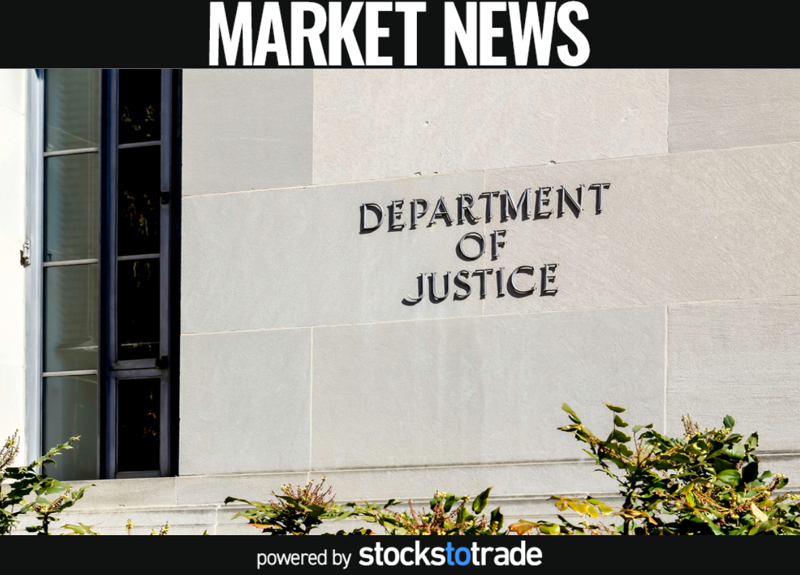- Anonymous sources detail investigation that could result in criminal charges…
- Largest stablecoin in the world has history of controversy…
- Regulators ramp up focus on stablecoins…
A major cryptocurrency company is reportedly facing federal scrutiny for fraud.
Bloomberg News first reported the U.S. Department of Justice is investigating accusations that executives of Tether committed bank fraud during the early days of the company’s stablecoin.
The case could potentially result in criminal charges and is expected to have broad implications for the world of cryptocurrencies.
Bloomberg cited three anonymous sources with direct knowledge of the investigation who said the probe is focused on accusations that executives misled banks by hiding the fact that Tether transactions were linked to cryptocurrency.
Tether has been under the DOJ microscope since 2018 and federal prosecutors have reportedly sent letters to the involved individuals, informing them they are targets of the investigation and that a decision could be made soon.
The DOJ declined to comment on the report and in a statement to Bloomberg Tether said, “Tether routinely has open dialogue with law enforcement agencies, including the DOJ, as part of our commitment to cooperation and transparency.”
What Is Tether?

Image credit: Robert Paternoster/Shutterstock.com
Tether is the largest stablecoin in the U.S. and the third-largest digital asset in the world by market cap.
Data from CoinGecko shows Tether’s market cap is more than $62 billion, compared to the USD Coin which has a $27 billion market cap, and the Binance USD Coin at just under $12 billion.
Tether was started in July 2014 — originally known as “RealCoin” — and trading of Tether tokens began in February.
It was started to work around issues that many early crypto traders and crypto businesses were facing with traditional banks.
At the time, traditional banks were wary of doing business with crypto due to concerns those companies that could be tied to illicit activities.
The stablecoin is now often used by traders to purchase other cryptocurrencies like Bitcoin instead of using traditional money.
The creator of Tether says the tokens “are anchored or ‘tethered’ to real-world currencies on a 1-to-1 basis and backed by our reserves,” which they claim protects users from volatility.
Tether’s History of Controversy
This isn’t the first time Tether has found itself under investigation for fraud.
In 2018, New York Attorney General Leticia James launched a state investigation against the company.
James said, “Our investigation has determined that the operators of the ‘Bitfinex’ trading platform, who also control the ‘tether’ virtual currency, have engaged in a cover-up to hide the apparent loss of $850 million dollars of co-mingled client and corporate funds.”
“New York state has led the way in requiring virtual currency businesses to operate according to the law. And we will continue to stand-up for investors and seek justice on their behalf when misled or cheated by any of these companies.”

Image credit: STEVLTH/Shutterstock.com
The AG obtained a court order that required the operators of the companies to immediately cease further dissipation of the U.S. dollar assets which back Tether tokens in the state while that investigation was conducted.
Earlier this year, James’ office announced Bitfinex and Tether would be required to end all trading activity with New York residents.
The companies also agreed to pay $18.5 million in penalties and “must submit to mandatory reporting on core business functions.”
The AG’s office said their investigation “found that iFinex — the operator of Bitfinex — and Tether made false statements about the backing of the “tether” stablecoin, and about the movement of hundreds of millions of dollars between the two companies to cover up the truth about massive losses by Bitfinex.”
James also said Tether lied about its stablecoin being backed by the U.S. Dollar at all times.
“The OAG’s investigation found that, starting no later than mid-2017, Tether had no access to banking, anywhere in the world, and so for periods of time held no reserves to back tethers in circulation at the rate of one dollar for every tether, contrary to its representations.”
The investigation also found Tether produced fraudulent “verification” of its cash reserves multiple times.
“In the face of persistent questions about whether the company actually held sufficient funds, Tether published a self-proclaimed ‘verification’ of its cash reserves, in 2017, that it characterized as “a good faith effort on our behalf to provide an interim analysis of our cash position.” In reality, however, the cash ostensibly backing tethers had only been placed in Tether’s account as of the very morning of the company’s ‘verification.’”
“On November 1, 2018, Tether publicized another self-proclaimed ‘verification’ of its cash reserve; this time at Deltec Bank & Trust Ltd. of the Bahamas. The announcement linked to a letter dated November 1, 2018, which stated that tethers were fully backed by cash, at one dollar for every one tether. However, the very next day, on November 2, 2018, Tether began to transfer funds out of its account, ultimately moving hundreds of millions of dollars from Tether’s bank accounts to Bitfinex’s accounts. And so, as of November 2, 2018 — one day after their latest ‘verification’ — tethers were again no longer backed one-to-one by U.S. dollars in a Tether bank account.”
Stablecoin Regulations On The Horizon
The DOJ probe also comes at a time when stablecoins are under the regulatory spotlight.
Treasury Secretary Janet Yellen highlighted the issue during a meeting of the President’s Working Group on Financial Markets earlier this month.
The Treasury Department said, “participants discussed the rapid growth of stablecoins, potential uses of stablecoins as a means of payment, and potential risks to end-users, the financial system, and national security.”
During the meeting, Yellen herself “underscored the need to act quickly to ensure there is an appropriate U.S. regulatory framework in place.”
The President’s Working Group said it intends to release its recommendations for stablecoin regulations in the coming months.
Featured image editorial credit: JHVEPhoto / Shutterstock.com

